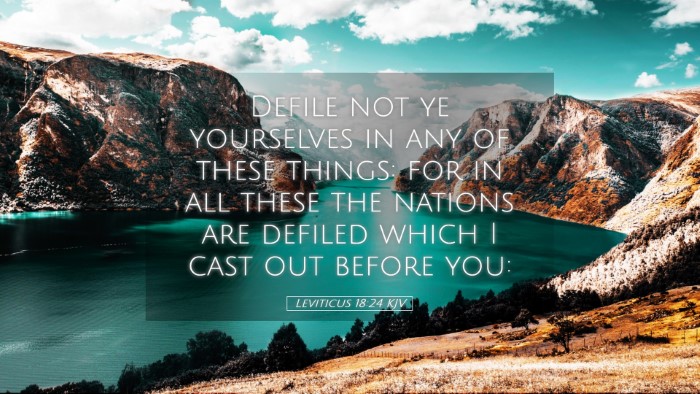Commentary on Leviticus 18:24
Leviticus 18:24 states: "Defile not ye yourselves in any of these things: for in all these the nations are defiled which I cast out before you." This verse serves as a critical warning against the practices of idolatry and immoral behaviors prevalent in the nations surrounding Israel. It emphasizes God's desire for His people to remain holy and separate from the corrupt practices of others.
Contextual Background
The Book of Leviticus, often regarded as a manual for the priests and the worship of Israel, contains laws and regulations that define holiness in the community of believers. This chapter, in particular, deals with various prohibitions pertaining to sexual morality, idolatry, and social conduct. The intent is to establish a covenant identity for Israel, setting them apart from the other nations.
Exegesis and Interpretation
The phrase "Defile not ye yourselves" serves as both a command and a reminder of Israel's call to holiness. Various public domain commentaries provide insights into this verse:
- Matthew Henry: He emphasizes the seriousness with which God views defilement and its consequences. Henry notes that the Canaanite nations faced judgment because of their abominable practices, and Israel is warned against adopting similar behaviors. He states that the sins of the nations do not merely grieve God but provoke His wrath, thereby illustrating the importance of moral purity.
- Albert Barnes: Barnes highlights that the defilement happens not just externally through actions but internally as well. He points out that God's covenant people are to live distinct lives that reflect His commandments. The phrase underscores the relationship between social conduct and spiritual integrity, arguing that the lives of God's people ought to reflect His holiness through their behaviors.
- Adam Clarke: Clarke expands on the cultural contexts of the command. He observes that the practices decried in the preceding verses often involved grotesque idolatry and sexual immorality. Clarke suggests that to defile oneself is to participate in behaviors that are abhorrent to God and will lead to the eventual downfall of the people who engage in such activities.
Theological Reflection
This verse invites a theological reflection on the nature of holiness. God’s commands are rooted in His character, and any deviation from these commands can lead His people into disarray. The idea of being 'defiled' encapsulates the broader implications of sin that affect both the individual and the community.
Holiness and Community
Henry addresses the notion that Israel has a collective responsibility to uphold holiness among themselves. This communal aspect of holiness reminds believers today that one person's sin can influence the entire body of Christ. As Paul articulates in 1 Corinthians 5:6, "A little leaven leavens the whole lump."
Application for Today
Pastors and theologians can draw parallels between ancient Israel’s calling to separation from sin and the modern church's challenges. Just as Israel was warned about global influences that could corrupt their identity, today's believers must discern the cultural and moral elements that threaten their faith and witness.
- Call to Righteous Living: The call for holiness remains relevant. Believers are reminded that their actions, words, and lifestyle must reflect Christ’s righteousness.
- Understanding Judgment: God’s judgment against sin is not arbitrary but arises from His holiness and justice. Pastors can impart this understanding to encourage repentance and restoration within their congregations.
- Commitment to God's Standards: Upholding God's standards requires intentionality in teaching, accountability, and discipleship. Believers are called to resist cultural pressures that might compromise their witness.
Conclusion
Leviticus 18:24 serves as a timeless reminder of God's call to holiness. It is a cautionary statement against the defilements that can arise through cultural assimilation and moral compromise. The insights drawn from Matthew Henry, Albert Barnes, and Adam Clarke reinforce the importance of living distinctively and righteously in a world that often opposes such ideals. Ultimately, this passage calls the faithful to a commitment to holiness as a witness to the world and as a root of their identity as followers of God.


